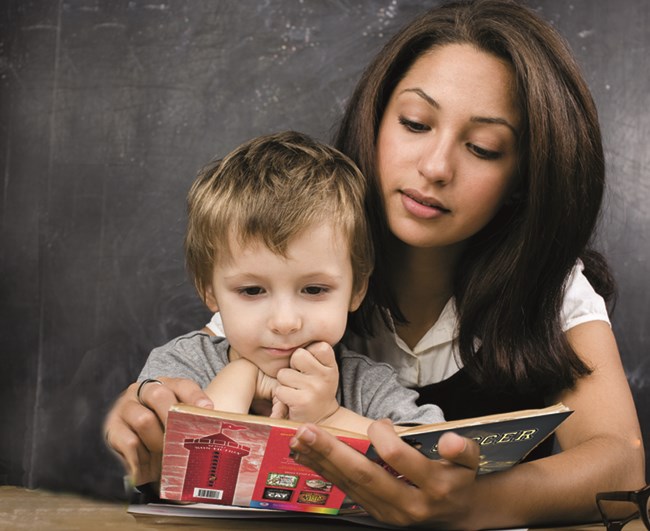Issue 95
Term 4 2015
Let's talk about literacy
Author and Director of The Literacy Tower, John Parsons reflects on the watershed moment he became an inspired reader, highlighting the need to provide engaging and high-interest texts to spark the same passion for reading in students today.
Search for 'literacy standards' on the web, and your first ten pages will be articles about plunging standards, woeful skills and a slippery slide towards becoming a nation of illiterates. Plough onwards for a bewildering array of cutting-edge initiatives, ambitious policies, and funding demands, all designed to reverse the appalling decline.
It is not until you are weary of clicking 'next page' that any measured statistics appear. If you've lasted that long, you discover that literacy standards in Australia, New Zealand, and the UK haven't declined significantly in the last twenty years. Despite decades of adapting our policies and practices, they remain relatively unchanged.
The real slide, I suggest, is not in literacy competency but in the level of engagement today's young readers have with the written word. It is not teaching practices or the curriculum that should be under the spotlight. I firmly believe it is the levelling, nature, and quality of classroom reading resources we need to examine. Here's why.
I'd like to share my watershed moment. Like most of my classmates, our school's traditional readers had given me a fair competency at decoding, a mildly appalling spelling ability, a disregard for grammar, and a distaste of boring writing. As my colleagues will attest, I've retained these core skills to this day, so there is no question the basics remain with you through life.
It wasn't until Year 2 that one teacher made a real difference. She did it by reading books to me that, had anyone found out, in those days would have probably seen her disbarred: The Famous Five, by Enid Blyton.
I was utterly enthralled. Suddenly reading wasn't just a race to get to the end of a reader or graduate to the next colour band. It was something to be savoured: a rich, rewarding experience with engaging characters, inspiring settings, and language to ignite the imagination. I sat in class, reading books way above my competency level, praying the bell wouldn't ring so I could finish my chapter. Quite simply, books opened my eyes to a world of possibilities. The traditional reading scheme had given me the basics, but being exposed to challenging, richly varied language, and captivating, high-interest texts made me a reader.
I loved going to the library and being free to choose books that seized my attention, regardless of their level. I was good at reading. I graduated to Biggles and ended up bilingual enough to intercept a useful range of German commands, had my plans to pilot a Spitfire squadron come to fruition. My teachers had other ideas. They made me sit with kids with literacy difficulties in the hope my enthusiasm would rub off. That's when I witnessed another watershed moment.

One older kid in our class could fell any other with a single punch. He was ten. He was frightening. And, I now realise, very troubled. He had no interest in anything, let alone reading.
Seating him beside the kid who did read didn't work. In despair, our teacher again did something that would have provoked a severe reprimand: she gave him a tatty pulp-fiction novel about a bikie gang, the sort of sensational rubbish popular in the seventies.
I watched that kid read the whole thing. Slowly, and with plenty of whispered pleas for me to decipher the harder words; but when he got to the last page, he asked the teacher if she could get him another one. She did, and that kid read books for the rest of the year. Hard books. Challenging books. The 'wrong' books. But he persevered, every day.
I've spent my adult life writing and publishing books that challenge and extend young readers – readers more media-savvy, print-aware, and visually discerning with each year. Books with different, inviting topics, storylines, and characters to enhance and extend contemporary kids' natural enthusiasm. Traditional readers may equip kids with the basics, but, after the emergent stage, teachers need to have resources built on a strong literacy framework to coax them beyond those readers. Readers that, let's face it, still use the core rationale and levelling criteria they did in my day.
Today's kids deserve resources that engage them and provide a bridge to real literature at the earliest stages. Never has it been more important to give kids challenging, high-interest, richly varied reading experiences that really do engage, inspire and ignite young imaginations. Those books work. They're working in Australian classrooms right now. No matter how hard they may appear, the right book will light up a kid's face. Beautifully designed literacy resources with a wealth of high-interest content and language that kids want to read will take them to the next level of reading confidence and accelerate them on the journey to becoming lifelong readers.
Educators do understand the spark those resources ignite and they know how to provide the watershed moment. To help them make a real difference to literacy engagement, it's vital that every classroom and school library has the contemporary reading resources that give them every opportunity to do so.
Image Credit
- The Literacy Tower. Used with permission.
